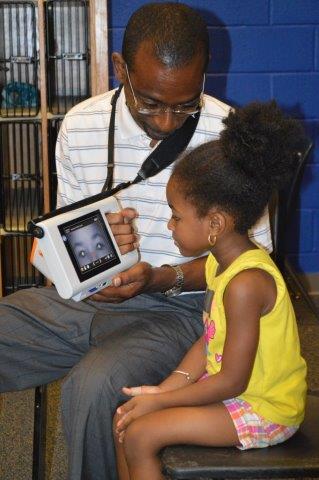Free Vision Screening Program for Preschool & School Age Children
The Atlanta Lions Club conducts free vision screening sessions at preschools, early childhood centers and elementary schools. The program is designed for children ages 1 to 12 years old. Screenings are also conducted at health fairs and other public events throughout Atlanta.
A screening is as simple as having your child’s picture taken. Atlanta Lions Club volunteers use state of the art vision screening devices, which are 85-90 percent accurate in detecting vision problems. The vision screening only takes seconds per child, requires no preparation or medication and is totally painless.
Why We Vision Screen Children?
Detecting vision problems early in life are very important as there is a critical period of vision development in the initial years of a child’s life. In addition, early treatment provides better results and helps prepare a child for kindergarten and grade school.
Most vision related problems are easily treated with eyeglasses. Early vision screening also helps identify children at risk of permanent vision loss from Amblyopia. Amblyopia develops in children from birth to 8 or 9 years of age and this condition affects 2-4% of children. Once a child has been screened and a potential vision problem detected the child should be referred to an ophthalmologist or optometrist for a comprehensive eye examination.
Atlanta Lions Club Results Much Higher Than Normal
National referral rate averages for preschool age children is approximately 8-9%. Referral rate averages in school age children increases as a child grows. In the several thousand vision screenings the Atlanta Lions Club has conducted for preschool and school age children the Club is finding a significantly higher referral rate than normal, especially within the low income, African American and Hispanic populations screened. Since 2016 the Atlanta Lions Club, in cooperation with the Georgia Lions Lighthouse Foundation, has been actively screening elementary school age children within the Atlanta Public School system.

Daylan of Connect Church Sports Camp
In 2015 the Atlanta Lions Club screened three-year-old, Daylan at the Connect Church Basketball Camp. The vision screening device used said Daylan should see a professional eye doctor for a full examination. At the time his mother said “as a three-year-old he was quiet and not saying much”. After getting his glasses, and now five-years-old, “he is engaged and talking more”. His father, who also wears glasses, says Daylan is doing “pretty good in school”. Lions Clubs across America vision screening children to identify low visual acuity and eye health problems so that children can performance to their best ability whether its on the sports field or inside the classroom.
Vision Screening Program Detects These Vision Problems:
Myopia (Nearsightedness) – Myopia causes the eyes to focus incorrectly, making distant objects appear blurred. It can be treated with glasses, and typically is not amblyogenic as long as both eyes have similar degrees of myopia.
Hyperopia (Farsightedness) – Hyperopia causes difficulty seeing objects that are near. Small levels of far-sightedness are normal for young children, but high levels can cause problems. Left untreated, hyperopia can contribute to crossing of the eyes or poor vision in each eye. This condition can be corrected with glasses.
Astigmatism – Astigmatism is a condition in which the cornea (the clear covering of the front of the eye) has an abnormal curve, causing out-of-focus vision. Typically, an eye with astigmatism is not perfectly round but is slightly oblong, creating astigmatism. Astigmatism is not amblyogenic unless it is asymmetric or of a large degree. This condition can be corrected with glasses.
Strabismus – Strabismus is when the eyes are not directed to an object simultaneously. Sometimes the eyes deviate inward, and other times the eyes deviate outward. Vertical Deviations can also occur, but are quite rare. Strabismus may lead to Amblyopia, or lazy eye which ultimately causes functional blindness in the weak eye.
Anisometropia – Anisometropia is a condition in which the two eyes have unequal refractive power–they are in different states of myopia (nearsightedness) or hyperopia (farsightedness). Anisometropia can adversely affect the development of binocular vision in infants and children if there is a large difference in clarity between the two eyes. The brain will often suppress the vision of the blurrier eye in a condition called Amblyopia, or lazy eye.
Anisocoria (Unequal Pupil Size) – Slight differences in pupil sizes are found in healthy people. Unequal pupil sizes of more than 1.5 mm may be a sign of an eye, brain, blood vessel, or nerve problem.
Below is a short video of a young girl screened by a Lions Club in Upstate New York. The screening detected an early sign of a rare cancerous tumor which saved her life.



